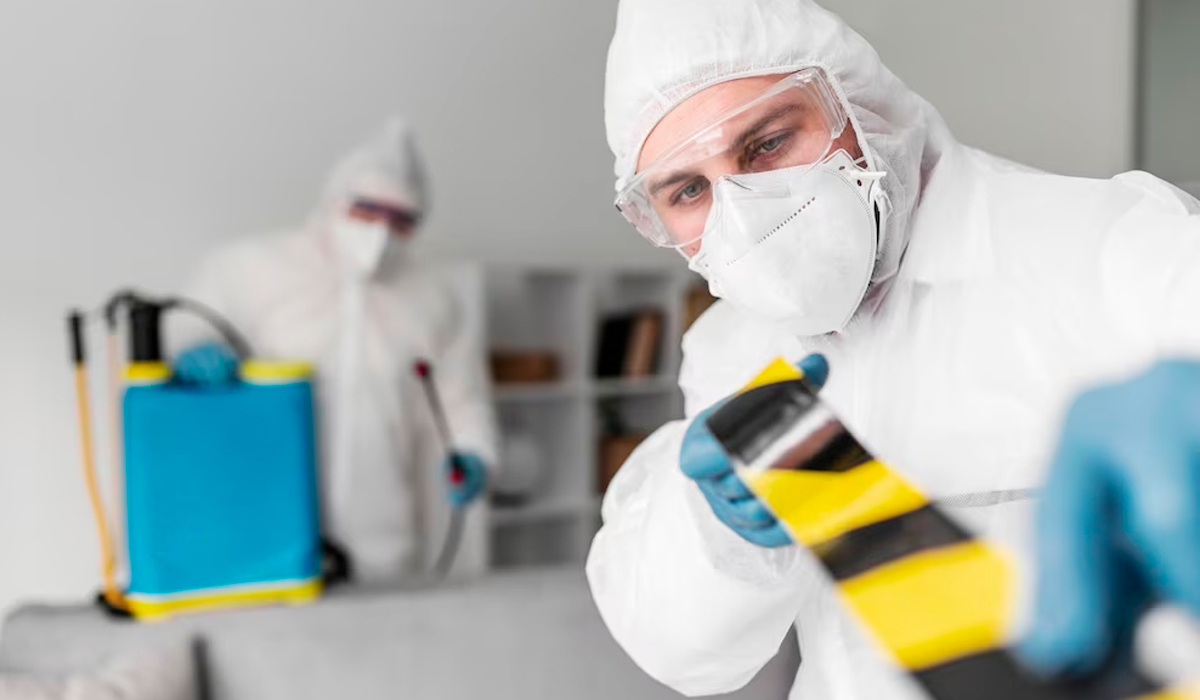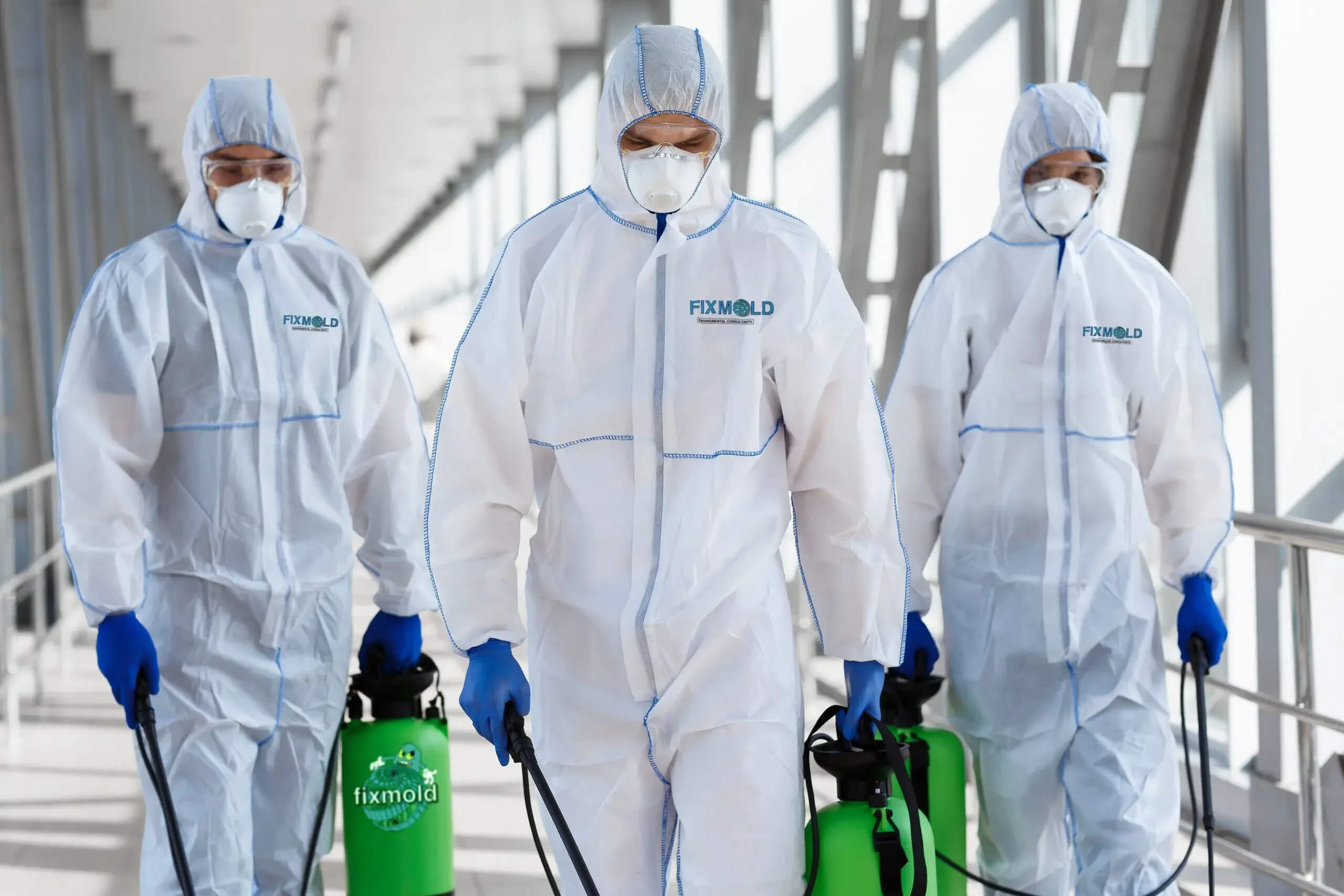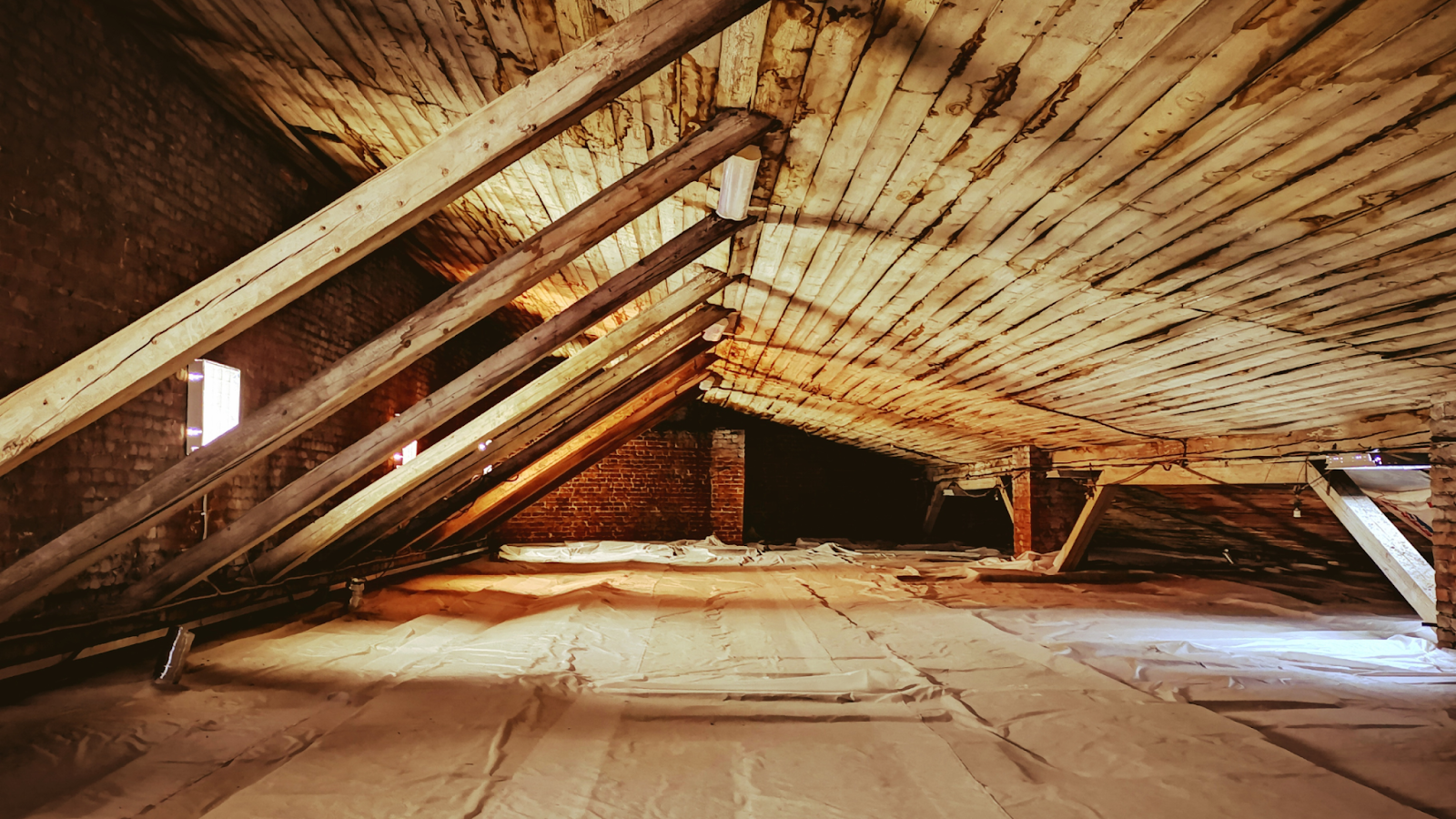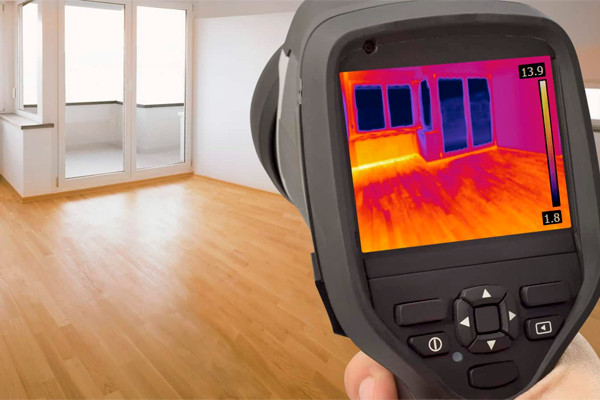
Certified Mold Specialists: Ensuring Safe Environments
I. Introduction
Certified Mold Specialists are crucial in property management, ensuring the safety and health of tenants. When selecting a licensed mold technician, certain qualities are essential. As a property manager, it is vital to maintain a secure and healthy environment for tenants, considering the serious risks posed by mold. This article provides valuable insights to help you make informed decisions and ensure effective mold removal services.
In the following sections, we will explore the definition and qualifications of certified mold specialists, the process of mold assessment and testing, mold remediation techniques and best practices, strategies for mold prevention and control, the health hazards of mold, choosing the right certified mold specialist, and the benefits of working with professional mold remediation companies.
So, let’s embark on this journey together and equip you with the knowledge you need to tackle mold-related challenges with confidence!
II. Understanding Certified Mold Specialists
When it comes to mold removal services, certified mold specialists are the experts you need on your side. These professionals possess the necessary qualifications, training, and experience to effectively assess, mitigate, and remediate mold issues in properties. Let’s dive deeper into their role and responsibilities, as well as the benefits of hiring certified professionals for property managers.
A. Definition and Qualifications of Certified Mold Specialists
Certified mold specialists are professionals who have undergone specialized training and acquired certifications in mold assessment, remediation, and related areas. They possess a deep understanding of mold growth patterns, identification techniques, and the proper steps required to effectively address mold problems.
These specialists often hold certifications from reputable organizations such as the National Association of Mold Professionals (NAMP) or the Institute of Inspection, Cleaning, and Restoration Certification (IICRC). These certifications validate their expertise and ensure that they adhere to industry standards and best practices.
B. Role and Responsibilities in Mold Removal Services
Certified mold specialists play a crucial role in the mold removal process. They begin by conducting a thorough assessment of the affected property to determine the extent of the mold infestation and identify the underlying causes. This assessment involves inspecting visible mold growth, testing the air quality, and examining areas prone to moisture buildup.
Once the assessment is complete, the specialists develop a comprehensive remediation plan tailored to the specific mold issues present. This plan includes implementing proper containment measures to prevent the spread of mold spores, utilizing advanced remediation techniques, and ensuring the removal of mold-infested materials.
Throughout the process, certified mold specialists prioritize the safety of occupants and follow strict protocols to minimize the disruption to the property. They use specialized equipment, such as HEPA filters and air scrubbers, to remove mold particles effectively and restore the indoor environment to a safe and healthy state.
C. Benefits of Hiring Certified Professionals for Property Managers
When faced with mold issues, property managers benefit greatly from hiring certified mold specialists. These professionals bring a wealth of knowledge and expertise to the table, ensuring that mold problems are addressed efficiently and effectively.
By working with certified specialists, property managers can have confidence in the accuracy of mold assessments and the implementation of appropriate remediation strategies. Certified professionals are well-versed in the latest industry advancements, regulations, and best practices, enabling them to deliver high-quality results.
Additionally, certified mold specialists understand the importance of timely action in mold removal. They work diligently to prevent further mold growth, minimizing the risk of property damage and potential health hazards for occupants. Their expertise helps property managers save time, money, and unnecessary stress by swiftly resolving mold issues.
III. The Process of Mold Assessment and Testing
Understanding the process of mold assessment and testing is crucial for property managers working with certified mold specialists. In this section, we will explore the importance of mold assessment, provide an overview of the mold testing procedures conducted by specialists, and discuss key factors considered during mold assessment.
A. Explaining the Importance of Mold Assessment
Mold assessment serves as the foundation for effective mold removal services. Moreover, it involves a thorough evaluation of the property to identify the presence of mold, determine the extent of the infestation, and identify any underlying moisture sources that contribute to mold growth.
By conducting a comprehensive mold assessment, certified specialists can develop targeted strategies for mold remediation. Additionally, this ensures that all affected areas are addressed and the root cause of the mold issue is resolved. Consequently, this proactive approach helps prevent recurring mold problems and ensures a safe and healthy environment for occupants.
B. Overview of the Mold Testing Procedures
Mold testing is a critical component of the assessment process, allowing certified mold specialists to gather important information about the type and concentration of mold present. There are different types of mold testing methods, including air sampling, surface sampling, and bulk sampling, each serving a specific purpose.
Air sampling involves collecting air samples from different areas of the property to measure the concentration of mold spores. Surface sampling involves swabbing or tape-lifting samples from visible mold growth to identify the specific type of mold. Bulk sampling involves collecting samples of materials suspected to be mold-infested, such as drywall or carpet.
These testing methods provide valuable insights into the severity of mold infestation, the types of mold present, and the potential health risks associated with exposure. Certified mold specialists interpret the test results to inform their remediation plan and ensure appropriate actions are taken.
C. Key Factors Considered During Mold Assessment
During mold assessment, certified specialists take several factors into consideration to gain a comprehensive understanding of the mold issue. These factors include the visual signs of mold growth, the presence of musty odors, the history of water damage or moisture issues, and the occupant’s reports of any health symptoms associated with mold exposure.
Additionally, certified mold specialists assess the indoor air quality and humidity levels in the property. They also inspect areas prone to moisture accumulation, such as basements, bathrooms, and crawl spaces, to identify potential sources of mold growth.
By considering these key factors, certified mold specialists can develop a customized remediation plan that effectively addresses the mold issue, eliminates the source of moisture, and prevents future mold growth.
IV. Mold Remediation Techniques and Best Practices
Effective mold remediation techniques are essential for property managers seeking to address mold issues. In this section, we will provide an overview of these techniques, highlight the importance of containment methods and ventilation systems, and discuss industry standards and guidelines for mold removal.
A. Overview of Effective Mold Remediation Strategies
Certified mold specialists employ various strategies to remediate mold infestations and restore a healthy environment. These strategies may include:
- Containment: Proper containment measures are crucial to prevent the spread of mold spores during the remediation process. Certified specialists use physical barriers and negative air pressure systems to isolate the affected areas and ensure that mold particles do not contaminate other parts of the property.
- Removal of Mold-Infested Materials: Mold can infiltrate porous materials such as drywall, carpeting, and insulation. Certified mold specialists follow industry best practices to safely remove and dispose of these mold-infested materials, minimizing the risk of cross-contamination.
- Cleaning and Disinfection: Non-porous surfaces that have come into contact with mold are thoroughly cleaned and disinfected using appropriate antimicrobial solutions. This step helps eliminate any remaining mold spores and prevents future growth.
- Drying and Dehumidification: Addressing the underlying cause of mold, which is often excess moisture, is crucial. Certified specialists employ drying techniques and utilize dehumidifiers to reduce humidity levels and create an environment inhospitable to mold growth.
B. Importance of Containment Methods and Ventilation Systems
Containment methods play a significant role in mold remediation to prevent the spread of mold spores. Certified mold specialists carefully seal off the affected areas using plastic sheeting and employ negative air pressure machines to ensure that any released spores are captured and filtered out. This containment prevents cross-contamination and protects unaffected areas of the property.
Additionally, ventilation systems play a vital role in mold remediation. Proper airflow and ventilation help remove excess moisture from the air and maintain optimal humidity levels, reducing the risk of mold growth. Certified specialists may recommend installing or improving ventilation systems to enhance air circulation and prevent future mold problems.
C. Discussion of Industry Standards and Guidelines for Mold Removal
The mold remediation industry follows established standards and guidelines to ensure effective and safe practices. These standards are set by reputable organizations such as the Environmental Protection Agency (EPA) and the Institute of Inspection, Cleaning and Restoration Certification (IICRC).
Certified mold specialists adhere to these industry standards and guidelines when conducting mold remediation services. These guidelines outline the proper procedures for mold assessment, containment, removal, cleaning, and post-remediation verification. By following these standards, certified specialists ensure that mold issues are addressed comprehensively and in a manner that prioritizes safety and effectiveness.
V. Mold Prevention and Control Strategies
Mold prevention is key for property managers to maintain a healthy and mold-free environment. In this section, we will highlight the significance of mold prevention, identify common causes of mold growth in properties, and provide essential steps for property managers to prevent mold issues.
A. Highlighting the Significance of Mold Prevention
Proactive mold prevention is far more cost-effective and less disruptive than dealing with a full-blown mold infestation. By implementing preventive measures, property managers can save themselves the time, effort, and expenses associated with mold remediation.
Mold prevention also contributes to the well-being of occupants. By creating an environment that inhibits mold growth, property managers can ensure the health and comfort of residents, reducing the risk of respiratory problems and other health issues associated with mold exposure.
B. Identifying Common Causes of Mold Growth in Properties
Understanding the common causes of mold growth helps property managers address the underlying issues and implement targeted prevention strategies. Some of the primary contributors to mold growth include:
- Moisture Intrusion: Water leaks from plumbing, roofs, or windows can create a damp environment ideal for mold growth. Property managers should promptly address any signs of moisture intrusion and repair leaks to prevent mold formation.
- Poor Ventilation: Insufficient airflow and ventilation can result in excess humidity, providing favorable conditions for mold growth. Ensuring proper ventilation in areas prone to moisture, such as bathrooms and kitchens, helps minimize the risk of mold.
- High Humidity: Areas with high humidity levels, such as basements or areas with inadequate dehumidification, are prone to mold growth. Property managers should monitor humidity levels and utilize dehumidifiers to maintain optimal conditions.
C. Essential Steps for Property Managers to Prevent Mold Issues
Property managers can take proactive steps to prevent mold growth and maintain a mold-free environment. Here are essential measures to consider:
- Regular Inspections: Conduct routine inspections of the property to identify and address any signs of moisture intrusion, leaks, or condensation promptly.
- Proper Ventilation: Ensure adequate ventilation in areas with moisture sources, such as kitchens, bathrooms, and laundry rooms. Install exhaust fans or open windows to promote airflow and reduce humidity.
- Moisture Control: Monitor and address any sources of excess moisture, such as leaking pipes, roof leaks, or inadequate drainage. Promptly repair water damage and dry affected areas thoroughly.
- Education and Awareness: Educate tenants about the importance of reporting water leaks or signs of mold growth promptly. Encourage them to maintain cleanliness and report any concerns related to moisture or mold.
- Regular Cleaning: Regularly clean and dry surfaces prone to moisture accumulation, such as shower walls, window sills, and air conditioning units. This helps prevent mold spores from finding a suitable environment to grow.
VI. The Benefits of Professional Mold Services for Property Managers
Property managers stand to gain numerous benefits by enlisting the services of professional mold specialists. In this section, we will explore the advantages of hiring certified professionals for mold assessment, remediation, and ongoing maintenance, emphasizing the value they bring to property management.
A. Expertise and Experience in Mold Assessment and Remediation
Certified mold specialists bring a wealth of expertise and experience to the table when it comes to mold assessment and remediation. Their in-depth knowledge of mold growth patterns, identification techniques, and effective remediation strategies allows them to tackle mold issues with precision and efficiency.
By entrusting certified professionals with mold assessment and remediation tasks, property managers can have confidence in accurate assessments, thorough remediation plans, and long-lasting results. The specialists’ experience enables them to identify underlying causes of mold growth and implement targeted solutions, saving property managers time and resources.
B. Compliance with Industry Standards and Regulations
Professional mold services prioritize compliance with industry standards and regulations set by organizations such as the Environmental Protection Agency (EPA) and local health departments. Certified mold specialists stay up-to-date with the latest guidelines, ensuring that their practices align with the most current standards.
By hiring certified professionals, property managers can rest assured that the mold assessment, remediation, and maintenance processes adhere to these standards. This compliance not only ensures the safety and well-being of occupants but also protects property managers from potential legal and liability issues.
C. Time and Cost Savings
Property managers understand the value of time and cost savings in their operations. Certified mold specialists help achieve these savings by efficiently addressing mold issues and preventing future recurrences.
By swiftly and effectively remediating mold problems, certified professionals minimize the disruption to property operations and reduce downtime. This quick resolution saves property managers time and helps maintain tenant satisfaction.
Furthermore, certified mold specialists implement preventive measures and provide recommendations for ongoing maintenance to mitigate the risk of mold reinfestation. This proactive approach helps property managers avoid costly mold-related repairs and potential property damage in the long run.
D. Enhanced Indoor Air Quality and Occupant Health
Ensuring a healthy indoor environment is paramount for property managers. Certified mold specialists play a crucial role in improving indoor air quality and safeguarding the health of occupants.
By conducting thorough mold assessments, specialists identify hidden mold sources and potential allergens that can compromise indoor air quality. Their remediation efforts effectively remove mold spores, reducing the risk of respiratory issues and allergies caused by mold exposure.
Property managers can provide a safe and healthy living or working environment for occupants by partnering with certified mold specialists, who prioritize the well-being of residents and take proactive measures to maintain optimal air quality.
VII. Choosing the Right Mold Specialist for Property Managers
Selecting the right mold specialist is crucial for property managers seeking reliable and high-quality mold services. In this section, we will discuss important factors to consider when choosing a mold specialist, highlight the benefits of working with licensed professionals, and provide tips for conducting a thorough evaluation.
A. Factors to Consider When Choosing a Mold Specialist
When selecting a mold specialist, property managers should evaluate several factors to ensure they make an informed decision. Consider the following key aspects:
- Certification and Licensing: Look for professionals who are certified in mold assessment and remediation. This certification ensures that they have undergone proper training and adhere to industry standards.
- Experience and Track Record: Assess the specialist’s experience in the field. Review their portfolio, client testimonials, and case studies to gauge their expertise and successful outcomes.
- Range of Services: Determine if the specialist offers a comprehensive range of mold-related services, including assessment, remediation, and ongoing maintenance. This ensures a holistic approach to mold prevention and control.
- Reputation and References: Research the specialist’s reputation within the industry. Seek recommendations from other property managers or request references from the specialist to verify their professionalism and reliability.
- Insurance Coverage: Verify if the mold specialist carries adequate liability insurance. This protects both the property manager and the specialist in the event of any unforeseen damages or accidents during the mold remediation process.
B. Benefits of Working with Licensed Mold Professionals
Collaborating with licensed mold professionals brings numerous benefits to property managers. These benefits include:
- Compliance with Regulations: Licensed mold specialists are well-versed in local regulations and guidelines. Consequently, they ensure that all mold-related activities adhere to these regulations, minimizing the risk of legal and regulatory issues.
- Quality Assurance: Licensed professionals undergo rigorous training and examinations to obtain their credentials. Consequently, their expertise and adherence to industry standards ensure high-quality services and reliable results.
- Efficient and Effective Solutions: Licensed mold specialists possess the knowledge and experience to accurately assess mold issues. Moreover, they can develop targeted remediation plans and execute the necessary steps efficiently. This ultimately leads to effective solutions, thus saving valuable time and resources.
- Warranty and Guarantees: Licensed professionals often provide warranties or guarantees for their services. This gives property managers peace of mind, knowing that the mold issue will be addressed thoroughly, and any future problems will be taken care of.
C. Tips for Conducting a Thorough Evaluation
To conduct a thorough evaluation of potential mold specialists, property managers can follow these tips:
- Request Multiple Quotes: Obtain quotes from several mold specialists to compare their services, pricing, and inclusions. This helps property managers make informed decisions based on their specific requirements and budget.
- Ask for References: Reach out to previous clients and ask for references. This allows property managers to gain insights into the specialist’s reliability, professionalism, and overall satisfaction levels.
- Seek Detailed Proposals: Request detailed proposals from shortlisted specialists, outlining their approach, timeline, materials, and expected outcomes. This helps property managers assess the thoroughness and professionalism of the specialist’s plan.
- Communication and Rapport: Evaluate the specialist’s communication skills and responsiveness. Effective and open communication is vital for a successful collaboration between the property manager and the mold specialist.
VIII. Conclusion: Ensuring Mold-Free Properties for Peace of Mind
As a property manager, prioritizing mold prevention, assessment, and remediation is essential for maintaining a safe and healthy environment for occupants. By understanding the importance of mold services and partnering with certified professionals, you can ensure mold-free properties and peace of mind for both yourself and the residents.
A. Recap of Key Points
Throughout this article, we have explored the critical aspects of selecting a licensed mold technician and the qualities that matter when you are a property manager. Here are the key points to remember:
1. Mold issues can significantly impact the well-being of occupants and the property’s integrity, making it crucial for property managers to prioritize mold prevention and control.
2. Certified mold specialists possess the necessary expertise, experience, and compliance with industry regulations to effectively assess, remediate, and prevent mold growth.
3. By partnering with licensed professionals, property managers can benefit from their knowledge, efficient solutions, time and cost savings, enhanced indoor air quality, and compliance with industry standards.
4. When choosing a mold specialist, property managers should consider factors such as certification, experience, range of services, reputation, and insurance coverage.
5. Conducting a thorough evaluation through multiple quotes, references, detailed proposals, and effective communication helps property managers make informed decisions.
B. Embracing a Proactive Approach
Adopting a proactive approach to mold prevention and control is key to ensuring the longevity and value of your properties. Moreover, by implementing the strategies discussed in this article, you can reduce the risk of mold growth, minimize disruptions caused by mold issues, and create a healthy and comfortable living or working environment for occupants.
Regular inspections, proper ventilation, moisture control, tenant education, and consistent cleaning practices form the foundation of an effective mold prevention plan. Additionally, by incorporating these practices into your property management routine, you demonstrate your commitment to maintaining high standards and the well-being of those under your care. Furthermore, these proactive measures can save you significant costs in the long run by preventing extensive mold damage and remediation expenses.
C. Partnering with Certified Mold Specialists
When it comes to mold assessment, remediation, and ongoing maintenance, partnering with certified mold specialists is crucial. These professionals bring specialized knowledge, experience, and adherence to industry standards, ensuring the highest level of service and reliable results.
By choosing licensed professionals, property managers can benefit from their expertise in mold assessment, effective remediation techniques, compliance with regulations, and the peace of mind that comes with a job well done. The investment in professional mold services is an investment in the long-term health and satisfaction of your tenants.
D. Building a Mold-Free Future
As a property manager, you have the power to shape the living and working environments of your tenants. First and foremost, by prioritizing mold prevention, partnering with certified mold specialists, and embracing a proactive approach, you contribute to a mold-free future.
Furthermore, by taking the necessary steps to prevent, assess, and remediate mold issues, you create spaces that residents can truly call home and attract prospective tenants seeking a safe and healthy environment. Remember, the well-being and satisfaction of occupants go hand in hand with the integrity and value of your properties.




